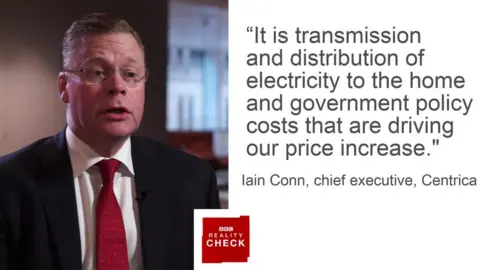Why has Centrica raised British Gas electricity prices?
 BBC
BBCThe claim: British Gas has been forced to increase prices because of rising distribution costs and government policy.
Reality Check verdict: Most of the increased costs came from Centrica having to pay extra costs for renewable energy.
British Gas announced on Tuesday that it would be raising electricity prices by 12.5% from 15 September.
Iain Conn, chief executive of Centrica, which owns British Gas, initially said the increase was not due to the electricity being more expensive, blaming the increase instead on the cost of getting the electricity to people's homes and the cost of government policy.
British Gas said that while its wholesale cost of electricity had fallen £36 per average domestic customer since 2014, its other costs had risen by £98 per customer.
Late in the day, Centrica said that £53 of that £98 was due to its need to buy Renewables Obligation Certificates (ROCs), which are certificates that companies need to buy in order to meet their obligations for generating energy from renewable sources.
Before revealing that, Centrica had cited the regulator Ofgem's latest supplier cost index, which showed that from May 2016 to May 2017, costs of providing dual fuel for energy suppliers had risen by 15%.
Handily, Ofgem breaks down that 15% cost increase into what has caused costs to rise.
It turns out that all of that increase in costs has come from increases in wholesale energy costs over the year.
But we know that as a result of the way it buys energy, British Gas did not experience an increase in wholesale energy costs. In fact, Iain Conn said: "We have seen our wholesale costs fall by about £36 on the typical bill since the beginning of 2014."
Network costs and costs of government obligations completely cancel each other out over the past year, making no difference to the average consumer bill at all.
Comparing costs with May 2016 may not be the most helpful figure - British Gas has announced price freezes twice during that period.
In December 2016 it froze prices until April - since then Ofgem's supplier cost index has fallen by 9%.
Then in February it extended the freeze until August - since then the index has fallen by 6%.
So according to the regulator, costs are well below the level at which British Gas felt it could freeze prices.
Centrica's release on Tuesday gave a bit more detail of the reason for the rise in electricity prices, saying: "The price rise reflects increasing delivery and environmental and social policy costs since 2014, and also the growing additional costs related to the UK smart meter rollout."
The cost of getting electricity to people's homes is significant - Ofgem estimates that it's about a quarter of an electricity bill.
Moving electricity and gas round the country is known as transmission. The very last leg of the journey into people's homes and businesses is known as distribution.
Since the start of 2014, Ofgem says that transmission has become more expensive while distribution is cheaper. Overall the difference is estimated at about £9 per customer bill.
We do not have estimates of the cost of government obligations going back to 2014, which is why the ROCs turn out to be so important.
The cost of smart metering also presents a problem because Ofgem excludes that from its costs to suppliers.
British Gas has installed more than 4 million smart meters so far. A government analysis estimated the cost of putting in a dual fuel smart meter at £107 per household or £67 for either gas or electricity, but of course that does not all need to be paid for in a single year.



